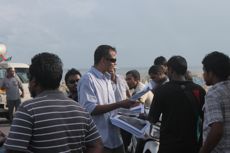Maldivians honored the eighth anniversary of Evan Naseem’s death and the subsequent shootings at Maafushi Jail in a rally at the tsunami memorial today.
The events of 20 September 2003 are considered critical moments in Maldivian democracy that led to the ousting of former president Maumoon Abdul Gayoom.
About 100 people attended the rally, which featured speeches and posters of torture victims. The event will continue tomorrow at 4:00pm.
Maldivian Democratic Party (MDP) founding member Mohamed ‘Bounty’ Nazim described his experience of Naseem’s death, and the protests that followed in Male’.
“We went to the cemetery and saw Naseem’s body. I cannot tell you how it felt. I felt very, very sad, the support I had for [former President] Maumoon was gone when I saw Naseem. I called my friends to come join us in protest against Maumoon,” he said.
On September 20, 2003, prisoners at Maafushi jail allegedly rioted against prison personnel, demanding an explanation for fellow inmate Evan Naseem’s death. Nineteen people were injured and three inmates killed.
Naseem “died due to grievous hurt caused to him by some personnel of Maafushi Jail Security System,” a report filed by the former administration claimed.
Citizens in Male’ rioted when Naseem’s mother Maryam allowed people to see her son’s body, which bore signs of torture.
Nazim said over 5000 people participated in the riot, and that police threw rocks and used arms against them.
Nazim informed Minivan News that today’s protest was “not an MDP event”. He said in two days he and 11 others would register the NGO “Activist Association of Maldives”, which will raise awareness about the penal system and strive to “stop the punishment of innocent people there,” Nazim said.
“We worry about Nasheed,” he said, referring to the Maldives’ current president. “Why not bring Maumoon to justice? There is proof that he ordered the shooting at Maafushi. But Maumoon is still powerful in the judiciary. I’m hoping that one day, we will have justice.”

Nazim said that protests will be held every year on September 20. Previous anti-torture protests were suppressed by the police, but “Nasheed gave us the freedom to speak, and today we are here peacefully,” said Nazim.
Over 3,000 messages were sent out and MPs were invited to the event. MP Reeko Moosa, who was claims to be a victim of torture, told the crowd that Gayoom “would not be allowed to hold power again”.
“We are happy now because there is no news that torture is happening under this government,” Moosa claimed, speaking to Minivan News. “But we are still watching things very carefully. Gayoom is trying to take power again, but it will not happen. We are against torture happening in the Maldives ever again.”
Moosa did say that the current administration “could do more.”
“The government needs more investigation, and it needs to bring the torturers to court,” he said.
Other speakers spoke out against Gayoom and his newly-formed Progressive Party of the Maldives (PPM). One man said the public should go to Gayoom’s house and “bring him out to face the people’s justice.”
Several torture victims who spoke to Minivan News expressed strong resentment for Gayoom. One Abdulla Naseeru said his “blood is boiling” and he wanted “to reach out and beat Gayoom.”
Naseeru reported being handcuffed and beaten in the same cell as President Nasheed for six months, and said he had spent a total of two years in prison.
“I wrote a letter to Gayoom after about my beatings, and his response was that the army and prison guards cannot be investigated,” he said. Naseeru said he still hears reports of prison beatings, and fears current investigations will be stopped by members of the former administration who still hold office.
Although the rally took place during school hours, a few interested teens joined the crowd. One said he was interested in politics, while his friend said he was curious to see what was happening. Both boys said their peers are aware of the issue.
Among those who attended the rally was a former army private who said he was willing to come out against Gayoom.
Evan’s mother Maryam Naseem was also in attendance. “It is very hard to be here,” she said. But she was pleased that Male was paying attention to the issue.
A government investigation into the events at Maafushi jail was launched by former President Gayoom, but the officers who were convicted were released before fulfilling their jail sentences. In June 2011, the case was re-opened and three former prison guards were sent back to jail.
Then-captain Adam Mohamed, who was allegedly responsible for Maafushi at the time, remains free.